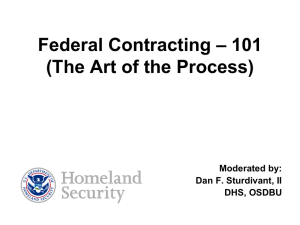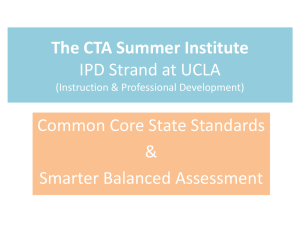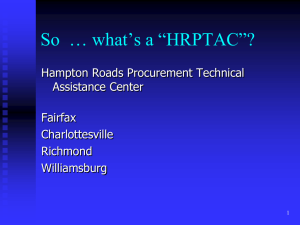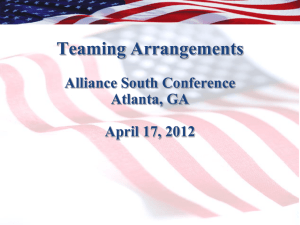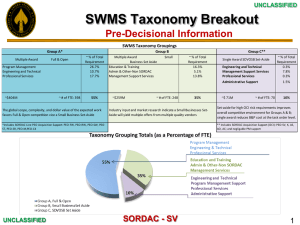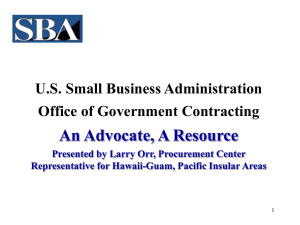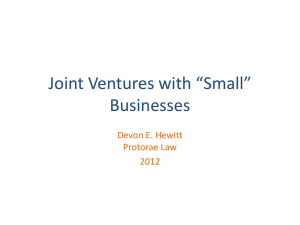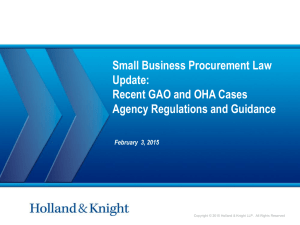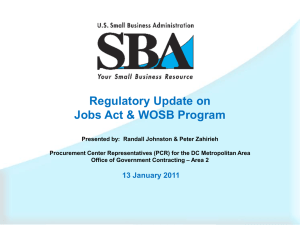NMCA_Small_Business_Presentation
advertisement
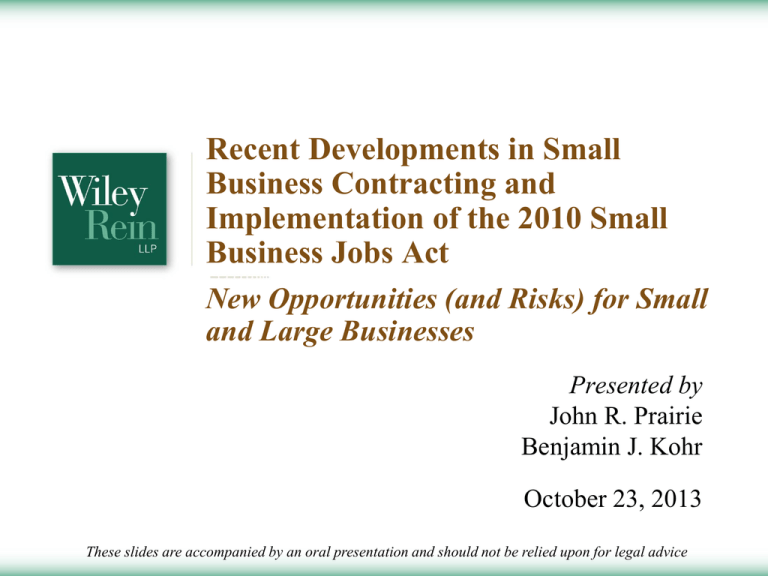
Recent Developments in Small Business Contracting and Implementation of the 2010 Small Business Jobs Act New Opportunities (and Risks) for Small and Large Businesses Presented by John R. Prairie Benjamin J. Kohr October 23, 2013 These slides are accompanied by an oral presentation and should not be relied upon for legal advice Road Map Overview of small business contracting • • • Implementation of the Small Business Jobs Act • • • Statistics Policies Set-asides Size misrepresentation penalties Multiple Award Contract set-asides Small business subcontract reporting requirements Other new developments Recent trends 2 Small Business Statistics Small businesses comprise: • • • • • • 99.7% of U.S. employer firms 64% of net new private-sector jobs 49.2% of private-sector employment and private-sector payroll 43% of high-tech employment 98% of firms exporting goods 33% of exporting value Current Administration committed to helping small businesses grow • • • Small businesses viewed as the “engines of job creation and essential to strengthening our national economy.” Utilization of small businesses will likely continue to be a primary focus in efforts to bolster stagnating economy Significant legislative and regulatory activity aimed at boosting contract dollars spent with small business 3 Small Business Statistics (cont’d) In fiscal year 2012, 22.25% of Government small business-eligible purchases went to small businesses • • Increase from 21.65% in fiscal year 2011; closing in on goal of 23% Department of Defense (DOD) accounted for majority of small business procurements Despite effort, concerns remain regarding small business participation • • • Prime contracting percentage up from 2011, but overall dollar amount down ($89.9B vs. $91.5B) Subcontracting percentage achievement continues to fall (FY12 – 33.6%; FY11 – 35%; FY10 – 35.4%) Exclusion of procurements from calculations FAA/TSA/CIA Goods sold or work performed overseas Fedmine and Small Business Committee studies found percentage closer to 19% without exclusions 4 Small Business Policies Small Business Act, 15 U.S.C. §§ 631 et seq. • 15 U.S.C. § 631(a) establishes policy to: • • “aid, counsel, assist, and protect” interests of small businesses; “insure that a fair proportion of the total purchases and contracts or subcontracts for property and services for the Government . . . be placed with small-business enterprises”; and “insure that a fair proportion of the total sales of Government property be made to such enterprises” Authorizes small business assistance programs. E.g., 15 U.S.C. §§ 631(d),(h), 636(i),(j) Establishes Government contracting goals (15 U.S.C. § 644(g)): 23% to small businesses Not less than 5% to woman-owned small businesses (WOSB) and small disadvantaged businesses Not less than 3% to service disabled veteran-owned small businesses (SDVOSB) and Historically Underutilized Business Zone (HUBZone) small businesses 5 Small Business Policies (cont’d) FY2012 statistics on achieving goals (Small Business Administration (SBA) rates achievement a “B”) 6 Small Business Policies (cont’d) Congress/White House can reach agreement on small business issues • • • Small Business Jobs Act of 2010, Pub. L. No. 111-240 Honoring America’s Veterans and Caring for Camp Lejeune Families Act of 2012, Pub L. No. 112-154 FY13 National Defense Authorization Act (NDAA), Pub. L. 112-239 Increased effort to push more work to small business • 23% goal constant but bigger push by Congress and Administration • Small business as innovators and “job creators” President Obama established Interagency Task Force on Federal Contracting Opportunities for Small Businesses (Office of Management and Budget (OMB), SBA, Commerce); OMB established small business procurement group for senior leaders to meet and discuss ways to increase agency small business contracting Stricter bundling rules in Small Business Jobs Act make more procurements eligible 7 Small Business Set-Asides Generally, procurement policy favors “full and open” competition FAR Subpart 19.5 provides exception to promote contracting with small business by allowing small business set-aside procurements • • Set-aside can be made unilaterally by Contracting Officer (CO) or by CO with SBA Can be set aside for small business generally or under one of the socioeconomic contracting programs Requirements for set-aside, FAR 19.502-1: • • • Determined to be in interest of maintaining/mobilizing full productive capabilities; or Assuring that a fair proportion of Government contracts in each industry category is placed with small business concern; and The “Rule of Two” is met 8 Small Business Set-Asides (cont’d) FAR 19.502-2 - The “Rule of Two” for all acquisitions of supplies and services • • • Acquisitions over $3k and under $150k: automatically set aside for small business unless CO determines no reasonable expectation to get offer from two or more responsible small businesses Over $150k shall be set aside when there is a reasonable expectation that: Offers will be obtained from at least two responsible small businesses; and Award will be made at fair market prices Small Business Jobs Act affirmed “parity” among federal small business contracting programs. FAR 19.203(a) For acquisitions over $150K, CO must first consider a setaside for a socioeconomic contracting program (8(a), HUBZone, SDVOSB or WOSB) before small business. FAR 19.203(c) 9 Small Business Set-Asides (cont’d) Recent changes to rules governing set-asides under multiple-award contracts • Delex Systems, Inc., B-400403, Oct. 8, 2008, 2008 CPD ¶ 181 • “Rule of Two” applies to task/delivery orders under indefinite delivery, indefinite quantity (ID/IQ) contract Thus, if two responsible small business ID/IQ holders, task/delivery order must be set aside Inconsistent application of decision by agencies Small Business Jobs Act § 1331 – Requires OFPP and GSA to establish guidance under which agencies “may, at their discretion”: Set aside part(s) of multiple award contract for small businesses; Set aside orders placed against multiple award contracts for small businesses; and Reserve one or more contract awards for small businesses under full and open multiple award procurements 10 Small Business Set-Asides (cont’d) Recent changes to rules governing set-asides under multiple-award contracts (cont'd) • • • FAR 19.502-4. Multiple Award Contract Set-Asides When conducting multiple award procurements, CO may, at his/her discretion, reserve one/more contract awards for small businesses, set aside part(s) of multiple award contract for small businesses, or set aside orders placed under multiple award contract for small businesses FAR 8.405-5. Federal Supply Schedules Preference program not mandatory, but CO may, at his/her discretion: Set aside orders or BPAs for small business concerns Set aside orders credited to ordering activity’s small business goals Ordering activities may consider socio-economic status when identifying contractors for consideration/competition for order or BPA 78 Fed. Reg. 61114 (Oct. 2, 2013) – New SBA final rule implementing various provisions of the Small Business Jobs Act governing small business 11 set-asides under MACs (See slides 22 –25) Challenging Small Business Set-Asides Growing number of challenges • • Set-asides remain difficult to challenge successfully • • Increased emphasis by agencies on setting aside contracts Fewer contract dollars available to large businesses due to sequestration and budgetary constraints Can protest (pre-award) agency conclusion that two small businesses are capable of performing at fair price Argue that market research is deficient Difficult to win on merits because so much discretion given to agencies Even if successful, corrective action could uphold a similar finding Early engagement with the customer, and teaming with a small business if necessary, remains the most effective option 12 Challenging Small Business Set-Asides: Recent Case Law Dynamic Educational Systems, Inc. v. United States, No. 12-730C (Fed. Cl. Feb. 25, 2013) – Protest denied • • • Adams & Associates, Inc. v. United States, No. 12-731C (Fed. Cl. Feb. 25, 2013) – Protest denied • Same holding as DESI decision Swank Healthcare, B-407367, Dec. 12, 2012, 2013 CPD ¶ 7 – Protest denied • • • Small business set-asides are competitive 15 U.S.C. 644 and FAR 19.502-1 do not require a contract-by-contract “fair proportion” analysis Set-aside decision was rational; Court will not second-guess CO’s business judgment Preference programs of FAR Part 19 are generally not applicable to Federal Supply Schedule (FSS) procurements under FAR Subpart 8.4 However, agency may, in its discretion, set-aside orders for small business concerns. VA properly exercised discretion after identifying five small FSS contract holders that could perform work and receiving two responses Illustrates the ongoing difficult in successfully challenging a small business set-aside 13 Small Business Jobs Act of 2010 Designed to stimulate the small business sector and create jobs The Small Business Jobs Act of 2010 contained a number of provisions designed to promote the utilization of small businesses in government procurements • • • Increase small business set-asides Encourage subcontracting with small businesses Economic incentives/loans Identified three goals for utilization of small businesses • • • Equal treatment across federal contracting programs Increased opportunities Combat fraud, waste, and abuse 14 Small Business Jobs Act of 2010 (cont’d) Significant Sections Section 1322 – Requires contractors to “make a good faith effort” to acquire supplies and services from the small business concerns used in preparing and submitting their proposal to the contracting agency (and in the same amount and quality), and to provide a written explanation to the contracting officer if the contractor fails to do so Section 1331 – Allows small business set-asides under multiple award contracts and the GSA Schedule Program Section 1334 – Requires a prime contractor to notify the contracting officer in writing whenever a payment to a subcontractor is reduced or is 90 days or more past due for goods and services provided for the contract and for which the federal agency has paid the contractor 15 Small Business Jobs Act of 2010 (cont’d) Significant Sections (cont’d) Section 1341 – Establishes a number of actions that will result in a “deemed certification” that the offeror is a small business, including submission of a bid or proposal for a procurement that is “reserved, set aside, or otherwise classified as intended for award to small business concerns” • Creates a “presumption of loss” to the Government Section 1342 – Requires annual certifications regarding size status on the Online Representations and Certifications (ORCA) database Section 1344 – Requires the SBA to conduct a “detailed review” of not less than 1/3 of the size standards for small business concerns every 18 months Section 1347 – Removes the existing mandatory preference for HUBZone concerns and creates parity between all socio-economic 16 programs SBA Implementation of Small Business Jobs Act Contract Bundling Final Rule issued on October 13, 2011 (76 Fed. Reg. 63542) Agencies required to post a list of all bundled contracts and a rationale for why the contract was bundled • Intended to reduce the practice of contract bundling as it restrains the ability of small businesses to participate Justification also required for consolidation of two or more separate requirements lower in cost than the proposed acquisition Further expanded in 78 Fed. Reg. 61114 to prohibit consolidated procurements unless: 1. 2. Benefits of consolidation “substantially exceed” benefits of alternatives Negative impact on small businesses is identified and mitigated 17 SBA Implementation of Small Business Jobs Act (cont’d) Parity Among Set-Aside Programs Final Rule issued March 2, 2012 (77 Fed. Reg. 12930) Clarified no order of precedence among 8(a), HUBZone, SDVOSB, or WOSB programs • Previously, HUBZone program interpreted to be given preference when setting aside procurements for small business Below SAT, the requirement to reserve acquisitions for small business concerns does not preclude CO from awarding a contract under one of the socioeconomic programs Above SAT, CO must first consider an acquisition under one of the socioeconomic programs before considering a small business setaside • Only exception: if requirement accepted under 8(a) program, it must remain under 8(a) 18 SBA Implementation of Small Business Jobs Act (cont’d) Presumption of Loss Final Rule implemented on June 28, 2013 (78 Fed. Reg. 38811) Where a contractor or subcontractor willfully misrepresents its small business size status, rebuttable presumption that the loss to the government is equal to the total dollars expended on the contract • In addition to forfeiture of contract payments, rule authorizes suspension and debarment, civil penalties under the FCA, and/or criminal penalties under the Small Business Act 19 SBA Implementation of Small Business Jobs Act (cont’d) Presumption of Loss (cont’d) “Willful misrepresentation” not defined • A number of acts deemed to be willful certification Submission of bid, proposal, application or offer Encouragement to classify solicitation as set-aside Database registration Determination made through judicial or administrative actions • Opportunity to present evidence that erroneous certification was result of good faith error 20 SBA Implementation of Small Business Jobs Act (cont’d) Presumption of Loss (cont’d) Applies to subcontractors who misrepresent status to receive subcontract award • While presumption is rebuttable, it appears to be a high bar Liability can extend to prime contractors absent good faith reliance on subcontractor representation, e.g., written size determination • Factors for determining good faith • Internal management procedures governing size representation or certification, Clarity or ambiguity of the representation or certification requirement Efforts made to correct in a timely manner Suggests prime contractors can request affirmative representations from subcontractors to avoid liability 21 SBA Implementation of Small Business Jobs Act (cont’d) Multiple Award Contract Set-Asides Final Rule issued on October 2, 2013 (78 Fed. Reg. 61114) • Operates in conjunction with an interim rule (76 Fed. Reg. 68032 (Nov. 2, 2011)) which provides COs with discretion to set aside all or part of MACs and individual task orders Guidance on when MACs and task/delivery orders may be partially set-aside or reserved for small businesses • • Applies to all “multiple award contracts” Does not supersede “Rule of Two” Where rule is not met, must give “meaningful consideration” to three set-aside options COs not required to utilize set-aside tools, but must document why not setting-aside is “consistent with the best interests” of the agency 22 SBA Implementation of Small Business Jobs Act (cont’d) Multiple Award Contract Set-Asides (cont’d) Partial set-aside • • • Reservation of contracts • Where a procurement’s requirements can be broken down into smaller, discrete, portions (e.g., CLINs), an agency may set aside a portion(s) for small business Must satisfy “rule of two” for that portion Small businesses may submit offers on the set-aside portion, nonset-aside portion, or both At least two small businesses could perform a portion of the contractor OR at least one could perform entire contract Order set-aside • • Commit (or reserve rights) in solicitation to set-aside individual task/delivery orders May be applied to existing MACs where “rule of two” met 23 SBA Implementation of Small Business Jobs Act (cont’d) Multiple Award Contract Set-Asides (cont’d) Limitations on Subcontracting/Nonmanufacturing Rule • • Compliance with LOS and nonmanufacturer rule on ID/IQs previously measured based on performance over guaranteed minimum Now measured differently depending on the type of set-aside Total and partial set-aside MACs Each performance period of the contract (i.e., base term and each option period thereafter) CO has discretion to require based upon period of performance for each order Full and open or reserved set-aside MACs Measured over the period of performance of the task/delivery order 24 SBA Implementation of Small Business Jobs Act (cont’d) Multiple Award Contract Set-Asides (cont’d) Off-Ramp/On-Ramp • • COs have authority to allow new small businesses onto a MAC during performance Permits agencies to “off-ramp” small businesses who become large during performance Application of Size Standards • • • Every MAC and task/delivery order must be assigned a single NAICS code which accurately reflects nature of work If a MAC can be divided into discrete categories (e.g., CLINs), each category should be assigned a separate NAICS code Orders issued under the category must utilize the appropriate NAICS code If multiple apply, must select the code that “represents the principal nature” of the work performed 25 SBA Implementation of Small Business Jobs Act (cont’d) Small Business Subcontracting Reporting Requirements Final Rule issued on July 16, 2013 (78 Fed. Reg. 42391) Prime contractors must make a good faith effort to award subcontracts to the same small businesses (at the same percentages) as identified in proposal • Must provide written justification to CO if fail to do so Notification, in writing, every time a small business subcontractor is paid a reduced price for goods and services or is paid more than 90 days after payment is due Annual reports of small business subcontracting achievements 26 SBA Implementation of Small Business Jobs Act (cont’d) Small Business Subcontracting Reporting Requirements (cont’d) Requires written notification to CO when prime contractor fails to use small business subcontractors if: • • • The offeror specifically references a small business concern in a bid or proposal; The offeror has entered into a written agreement with the small business concern for purposes of performing the specific contract as a subcontractor; or The small business concern drafted portions of the proposal or submitted pricing and technical information that appears in the bid or proposal, with the intent or understanding that the small business concern will perform that related work if the offeror is awarded a contract 27 SBA Implementation of Small Business Jobs Act (cont’d) Small Business Subcontracting Reporting Requirements (cont’d) Requires notification of CO by prime contractor if it “pays a reduced price” to a small business contractor or is late making payment • “Reduced price” is a price that is less than the price agreed upon in a binding contractual document • Payment to a subcontractor 90 days past due is “late” • Prime contractor must include the reason for the reduction in payment or failure to pay in the written notice • Explanation will be evaluated by CO as part of the evaluation of the prime contractor’s compliance with its subcontracting plan Subject to liquidated damages under FAR 28 SBA Implementation of Small Business Jobs Act (cont’d) Small Business Subcontracting Reporting Requirements (cont’d) COs are responsible for monitoring and evaluating prime contractors’ compliance with small business contracting plans • • CO is authorized to consider when conducting overall performance evaluation: Failing to utilize small business used in preparing proposal Reduced or late payment Authorized to consider whether to require the prime contractor to enter into a funds control agreement with a neutral third party if the prime contractor fails to pay subcontractors in a timely manner or fails to pay the agreed upon contract price without justification 29 SBA Implementation of Small Business Jobs Act (cont’d) Small Business Subcontracting Reporting Requirements (cont’d) • • CO must record the identity of a prime contractor with a history of unjustified, untimely payments to subcontractors in Federal Awardee Performance and Integrity Information System (FAPIIS) History of unjustified, untimely payments defined as three incidents within a 12 month period A prime contractor may not prohibit a subcontractor from discussing any material matter pertaining to payment or utilization with CO 30 Other New Developments FY13 NDAA included a number of provisions affecting small business contracting: • • Section 1641 - Expansion of Mentor-Protégé program to allow all small business concerns to participate Section 1651 - Changes calculation for the limitation on contracting to “more than 50% of the amount paid” to the prime contractor • No longer cost based Allows utilization of “similarly situated entities” Imposes a penalty of $500,000 or the dollar amount expended for violations Section 1682 – Removes requirement that suspension/debarment can only occur where a misrepresentation “indicates a lack of business integrity” Separate provision creates safe harbor for misrepresentations resulting from good faith reliance on advisory decisions 31 Other New Developments (cont’d) FY13 NDAA included a number of provisions affecting small business contracting (cont’d): • Section 1653 - Failure to comply in good faith with a subcontracting plan is deemed to be a material breach of the contract • May be considered in past performance evaluations Requires Prime contractors whose contracts require a small business subcontracting plan must notify a small business before it identifies the company as a potential subcontractor in a proposal or in a small business subcontracting plan SBA required to establish a reporting mechanism that allows a subcontractor or potential subcontractor to report fraudulent activity or bad faith by a contractor with respect to a subcontracting plan Section 1697 - Removes contract award cap for women-owned small businesses 32 Recent Small Business Trends Protests and size challenges • • Consistent with the general trend of increased protests in light of the current budget environment Set-aside challenges becoming more prevalent Increased enforcement efforts • • • Additional scrutiny of small business programs generally in wake of several high-profile scandals SBA Inspector General and Suspension/Debarment Official significantly more active Small business certification issues increasingly getting the attention of the Department of Justice and U.S. Attorneys’ Offices 33 Recent Small Business Trends (cont’d) Small business teaming arrangements • • “If you can’t beat them, join them.” Large businesses becoming more interested in the SBA’s Mentor/Protégé Program, joint ventures, and acting as subcontractors to small business Mergers and acquisitions • • • Shrinking federal budget has led to increased consolidation across the industry Small businesses leading the way in several key growth areas: cybersecurity; counterterrorism; intelligence, surveillance and reconnaissance (ISR); health information technology; and energy efficiency Acquisitions of small businesses create unique issues, e.g., notification requirements, continuation of current contracts, and eligibility for future small business awards 34 Questions and Contact Information John R. Prairie jprairie@wileyrein.com 202.719.7167 Benjamin Kohr bkohr@wileyrein.com 202.719.7493 35

